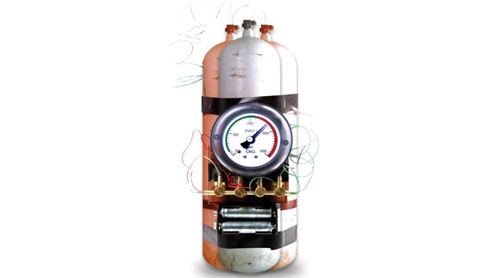 ISLAMABAD: The Task Force constituted by Petroleum and Natural Resources Secretary Muhammad Ejaz Chaudhry on Thursday finalised its proposals pertaining to countrywide testing and enforcement regime required to address the menace of exploding cylinders in vehicles.
ISLAMABAD: The Task Force constituted by Petroleum and Natural Resources Secretary Muhammad Ejaz Chaudhry on Thursday finalised its proposals pertaining to countrywide testing and enforcement regime required to address the menace of exploding cylinders in vehicles.
Ministry of Petroleum and Natural Resources Joint Secretary (Admin) Hamid Khan and Task Force Chairman Naeem Malik held a meeting with all concerned stakeholders in order to finalise the ‘action plan’ for countrywide testing of CNG kits, fittings and cylinders installed in vehicles to ensure public safety and to safeguard precious human lives.The final report would be ready by January 15, 2012 and be submitted to the apex court and Ministry of Interior by Petroleum and Natural Resources Secretary through Oil and Gas Regulatory Authority (OGRA) chairman, while arrangements are being made to implement the decisions on an urgent basis.
The participants unanimously agreed that only uniform and approved testing equipment would be used for testing at public and private testing centres which would operate under government guidelines, while policy decisions, approvals and certification would be the joint responsibility of a committee consisting OGRA, Hydrocarbon Development Institute of Pakistan (HDIP) and Chief Inspector Explosive (CIE) representatives.Experts also agreed that engineers would head all testing centres and staff would be trained and uniform testing fee would be decided by OGRA and would be applicable throughout the country for all testing centres. No one would be allowed to overcharge.Cylinders are to be disallowed under seats and in cabins of public transport vehicles.
Testing centres will be established with the help of the provincial governments and CNG Association at the district level with proper equipment and staff approved by the government, while testing equipment would be selected by CIE and HDIP from approved list of National Accreditation Council and Pakistan Standards and Quality Authority.It was also decided that RTA and Motor Vehicle Examiner (MVE) shall not issue route permits or fitness certificates for non-tested vehicles after the cut-off date and pilot project will commence within three days at HDIP testing centre in Islamabad where MVE and Regional Transport Authority (RTA) reps would be stationed as well.
Training and capacity building of all personnel including third party would also be ensured through Ministry of Technical and Professional Training and TEVTA and CNG stations will hire diploma holders to supervise refueling by staff who must be over 18. In case of conversion centres, engineers would be hired.Task Force also finalised that CNG station owners will implement the mechanism devised by the government to disallow refueling to non-tested vehicles as per their responsibility and licence.
Radio Frequency Identity chips would be affixed on tested vehicles and scanners would be installed at pumps. A central computerised database of all vehicles shall also be maintained, while public transport which has high mileage and wear and tear would be tested twice a year and private vehicles once a year.Necessary amendments would be made in the law to plug loopholes and to empower the traffic police and law enforcement agencies to crackdown on unsafe practices, on the other hand CIE will also ensure seizure of old, expired, non-registered and repaired cylinders, which are all unsafe.
Rooftop placement of cylinders is being considered to be allowed subject to shielding, safety and technical advice by OGRA.CIE, HDIP DG, OGRA executive directors, SSP Islamabad, SSP Traffic, ICT and Rawalpindi as well as RTA secretaries, MVE and representatives of respective public holding offices including industries participated in the meeting.












